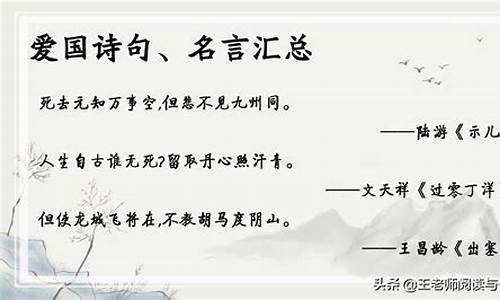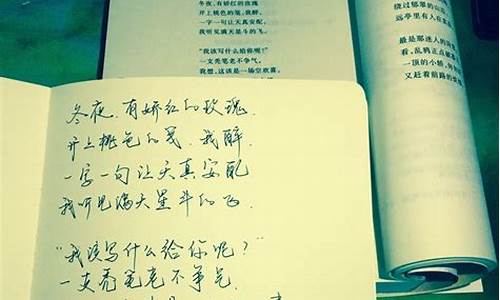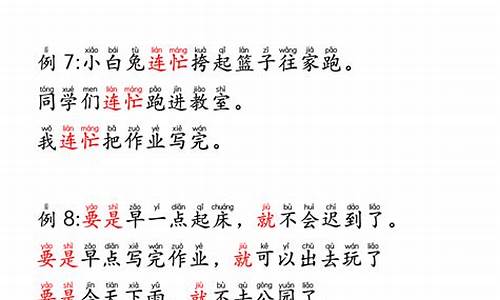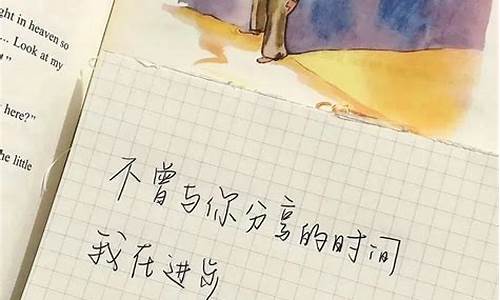您现在的位置是: 首页 > 好词好句 好词好句
英语重点短语句子_英语重点句子摘抄
tamoadmin 2024-10-18 人已围观
简介1.小学六年级英语重点知识2.初一到初三的重点英语短语加翻译3.初三英语重要知识点整理大全4.中考英语重要的词组 短语 句子5.初二上册英语课本上的重点句子以及短语,知识点。快点!!!!6.初三英语重点和常用的固定短语Unit 2复习要点 一、短语。 1. used to 过去常常 2. be afraid of 害怕… 3. over here 在这边 4. be interested in 对
1.小学六年级英语重点知识
2.初一到初三的重点英语短语加翻译
3.初三英语重要知识点整理大全
4.中考英语重要的词组 短语 句子
5.初二上册英语课本上的重点句子以及短语,知识点。快点!!!!
6.初三英语重点和常用的固定短语

Unit 2复习要点
一、短语。
1. used to 过去常常 2. be afraid of 害怕…
3. over here 在这边 4. be interested in 对…感兴趣
5. on the swim team 游泳队的队员. 6. be terrified of 惧怕…
7. go to sleep 入睡 8. all the time 一直
9. chat with… 和…聊天 10.stressed out 感到紧张
11.cause trouble/problems 惹麻烦 12.pay for 付款
13.look after 照顾 14.do sth. as well as sb. can 尽可能好地…
15.gym class 体操课 16.in the end 最终
17.make a decision 下决心 18.head teacher 班主任
19.talk with 和…谈论 20.to one’s surprise 令某人吃惊的是
21.even though 尽管 22.no longer=not… any longer 不再
23.take pride in 对…感到自豪 24.pay attention to 对…注意
25.give up doing 放弃做… 26.change one’s mind 改变某人的主意
27.with the lights on 开着灯…. 28.chew gum a lot 经常咀嚼口香糖
29.spend time doing 花时间做… 30.take sb. to concerts 带某人去音乐会
31.daily life 日常生活 32.afford to do 负担得起
33.a seven-year-old boy 一个七岁大的男孩子34.be alone 单独
35.no more=not… any more 不再 36.get into trouble 遇到麻烦
37.get into trouble with 和…引起冲突. 38.worry about 担心
39.walk to school = go to school on foot 步行去上学
40.take the bus to school = go to school by bus 坐公车去上学
41.go right home 直接回家 42.waste time 浪费时间
43.play the piano 弹钢琴 44.speak in front of a group 在人群面前讲话
45. in the last few years 在过去的几年里 46.send messages 发信息
47.be able to 能够 48.be made up of … 由……组成的
49.sound like … 听起来像 50.instead of … 代替……
二、句型。
1.I used to be afraid of the dark. 我以前害怕黑暗.
2.I go to sleep with my bedroom light on. 我开着卧室的灯睡觉.
3.I used to spend a lot of time playing games with my friends.
以前我常常花很多时间和我的朋友们玩游戏.
4.I hardly ever have time for concerts. 我几乎没有时间去听音乐会.
5.My life has changed a lot in the last few years. 在过去的几年里我的生活变化很大.
6.It will make you stressed out. 那会使你紧张的.
7.It seems that Yu Mei has changed a lot. 玉梅似乎变化很大.
三、语法。
1. used to 过去常常做某事,暗指现在已经不存在的动作或状态. 后跟动词原形.
否定形式为: didn’t use to 或 use not to / usedn’t to
疑问形式为: Did…use to…? 或 Used…to…?
Eg. I used to be really quiet.
I didn’t use to like tests.
Did you use to play the piano? Yes, I did./ No, I didn’t.
=Use you to play the piano? Yes, I use. / No, I use not.
You used to be short, didn’t you? Yes, I did./ No, I didn’t.
2. wear 表示状态. put on 表示动作. dress + 人 给某人穿衣服.
3. on the swim team on 是…的成员,在…供职.
4. Don’t you remember me? 否定疑问句.
Yes, I do. 不, 我记得. No, I don’t 是的, 我不记得了.
5. be terrified of 害怕的程度比 be afraid of 深.
6. miss: ① 思念, 想念 例: I really miss the old days.
② 错过, 未中, 未赶上, 未找到.
例: I’m sorry that you miss the bus.
7. no more (用在句中)=not…any more (用在句尾) 指次数;
no longer (用在句中)=not…any longer (用在句尾) 指时间.
8. It seems that Yu Mei has changed a lot. = Yu Mei seems to have changed a lot.
9. afford + n. /pron. afford + to do 常与can, be able to 连用.
例: Can you afford a new car?
His mother couldn’t afford to pay for her child’s education.
10. alone = by oneself 独自一人. lonely 孤独的, 寂寞的.
11. in the last/past + 一段时间
during the last/past + 一段时间 与现在完成时连用.
12. die (v.) dead (adj.) death (n.) dying (垂的)
小学六年级英语重点知识
篇一:英语短语句子
M1
1、世界奇观wonders of the world
2、以我的观点 in my opinion
3、超过more than (over)
4、大量的;无数的millions of
5、穿过大门 go through the gate
6、回答我的问题 answer my questions/reply to my questions
7、突然向下倾斜 fall away
8、在……上面;盖住 on top of
9、自然奇迹 natural wonders
10、参加讨论 join in the discussion
11、1700米宽 1700 meters wide
12、同意某人的观点 agree with sb.
13、清晨 the early morning
14、下车 get out of the car
15、5分钟后 in 5 minutes
16、在……底端 at the bottom of
17、在两边 on both sides
18、发电 produce electricity
M2
1、从那以后 since then
2、各种各样的 all kinds of
3、去度假 take a vacation
4、玩得高兴 have fun
5、一……就…… as soon as
6、摆放餐具 lay the table
7、洗盘子 wash the dishes
8、照顾,照料 take care of
9、休息三天 have three days off
10、国庆节 the National Day
11、去野餐 have a picnic
12、在……的末端 at the end of
13、公休假日 public holidays
14、……的开端 the beginning of/start of
15、为……而感谢give thanks for
16、当地人 the local people
17、作简短的讲话 make short speeches
18、在17世纪in the 17th century
19、接下来的一年the following year
M3
1、一块金牌 a gold medal
2、参加一次会议 attend the meeting
3、去国外 go abroad
4、再一次 once again
5、放弃 give up
6、放弃做某事 give up doing
7、为……而 die for
8、照顾 take care of / look after
9、那时候 at that time
10、独自一人 on one’s own
11、设法做成某事 manage to do sth.
12、继续做某事 continue doing
13、于 die of
14、给……做手术 do an operation on
15、最好的乒乓球运动员之一 one of the best table tennis players
16、努力训练 train hard
17、告诉某人关于某事 tell sb. about sth.
18、停止做某事 stop doing
19、停下来去做某事 stop to do
20、到国外上大学 attend university abroad
21、7年后(用于一般过去时) 7 years later
22、足够好 good enough
23、一个真正的英雄 a true hero
24、一个坚强的意志 have a strong will
25、开始做某事 start to do / begin to do
26、伤员 the wounded soldiers
27、训练课程 train courses
28、挽救很多生命 save many lives
29、最后 in the end
30、使他成为一名英雄 made him a hero
M4
1、短信 text message
2、两个 a couple of
3、关闭 turn off
4、担心 worry about / be worried about
5、出差 on business
6、在沙发上 on the sofa
7、在午夜 at midnight
8、醒来 wake up
9、上交 hand in
10、整天 all day long
11、不能做某事 be unable to do sth.
12、对某人来说重要 be important for sb.
13、耽误两周的课 miss two weeks of lessions
14、小心对待 be careful with
15、大量 plenty of
16、确保 make sure
17、做简单的饭 cook simple meals
18、建议某人做某事 suggest (that) sb. (should) do sth.
19、即将做某事 be about to do sth.
20、两周后(将来时) in 2 weeks / in a couple of weeks
21、保持整洁 keep tidy
22、旅行愉快 have a good trip
23、有点不开心 fell a bit unhappy
24、对……厌烦 be bored with
25、让我独自生活 leave me alone
26、实现 come true
27、醒的晚 wake up late
28、匆忙去学校 hurry to school
29、跟我要作业 ask me for my homework
30、感到孤独 feel lonely
31、做这么好吃的食物 cook such delicious food
32、讲笑话 tell funny jokes
33、一……就…… as soon as
M5
1、禁止吸烟 No smoking.
2、禁止拍照 No photos.
3、禁止触摸 No touching.
4、禁止大喊 No shouting.
篇二:英语经典短语100句
1. It’s up to you.(由你决定。)
2. I envy [羡慕]you.(我羡慕你。)
3. How can I get in touch with you?
4. plain about/of 抱怨
36. change…into… 把…变成… (= turn into)
37.with the help of 在…的帮助下
38. compare…to (with)… 把…和…作比较
39.think of (think about) 想起,想到
40.physical problems身体上的问题
41.break off 中断,突然终止
42. not…at all 根本不,全然不
二、重点句子:
1. How do you study for a test? 你怎样为考试做准备?
2. I have learned a lot that way. 用那种方法,我已经学到了很多东西。
3.It’s too hard to understand the voice. 听懂那些声音太难了。
4.Memorizing the words of pop songs also helped a little.记流行歌曲的词也起作用。
5. Wei Ming feels differently. 卫明有不同的'感受。
6.He finds watching movies frustrating. 他觉得看**让人感到沮丧.
7.She added that having conversations with friends was not helpful at all. 她又说和朋友对话根本没用。
8.I don’t have a partner to practice English with. 我没有搭档一起练习英语。
9.Later on, I realized that it doesn’t matter if you don’t understand every word. 随后,我认识到听不懂每个词并没有关系。
10.It’s amazing how much this helped. 我惊异于这些方法竟如此有用。
11.My teacher is very impressed. 给老师留下了深刻的印象。
12.She had trouble making complete sentences. 她很难造出完整的句子。
13.What do you think you are doing? 你在做什么?
14.Most people speak English as a second language. 英语对于大多数人来说是第二语言。
15.How do we deal with our problem? 我们怎样处理我们的问题?
16.It is our duty to try our best to deal with each challenge in our education with the help of our teachers. 在老师的帮助下尽我们
最大的努力来应对挑战是我们的责任。
17.He can’t walk or even speak.他无法走路,甚至无法说话
Unit 2
一、重点词组:
1. be more interested in 对…更感兴趣.
2. on the swim team 游泳队的队员.
3. be terrified of 害怕.
4. gym class 体操课.
5. worry about. 担心.
6. all the time 一直, 总是
7. chat with 与…闲聊
8. hardly ever 几乎从不
9. walk to school = go to school on foot
take the bus to school = go to school by bus 步行去学校
10. as well as 不仅…而且
11. get into trouble 遇到麻烦
12. make a decision 做出决定
13. to one’s surprise 使某人吃惊的是
14. take pride in 为…感到骄傲
15. pay attention to 留心, 注意
16. consist of 由…组成/构成.
be made up of 由…组成/构成.
17. instead of 代替, 而不是
18. in the end 最后, 终于
19. play the piano 弹钢琴
二、重点句子:
1.I used to be afraid of the dark. 我以前害怕黑暗.
2.I go to sleep with my bedroom light on. 我开着卧室的灯睡觉.
3.I used to spend a lot of time playing games with my friends. 以前我常常花很多时间和我的朋友们玩游戏.
4.I hardly ever have time for concerts. 我几乎没有时间去听音乐会.
5.My life has changed a lot in the last few years.
6.It will make you stressed out. 那会使你紧张的.
7.It seems that Yu Mei has changed a lot. 玉梅似乎变化很大.
Unit 3
一、重点词组:
1. be allowed to do sth 被允许干…
allow sb to do sth 允许某人干…
allow doing sth 允许干…
2.sixteen-year-olds = sixteen-year-old boys and girls 16岁的孩子
3. part-time jobs 兼职工作
4. a driver’s license 驾照
5. on weekends 在周末
6. at that age 在那个年龄段
7. on school nights 在上学期间的每个晚上
8. stay up 熬夜
9. clean up (相当与及物动词) 清扫
10. fail (in) a test 考试不及格
11. take the test 参加考试
12. the other day 前几天
13. all my classmates 我所有的同学
14. concentrate on 全神贯注于
15. be good for 对…有益
16. in groups 成群的,按组的
17. get noisy 吵闹(系表结构)
18. learn from 向某人学习
19. at present 目前,现在
20. have an opportunity to do sth 有做…的机会
21.English-English dictionary 英英词典
22. at least 至少
23.eight hours’ sleep a night 每晚8小时的睡眠
24. an old people’s home 敬老院
25. take time to do sth 花费时间干…
26. primary schools 小学
27. have…off 放假,休息
28. reply to 回答,答复
29. get in the way of 妨碍
30. a professional athlete 职业运动员
31. achieve one’s dreams 实现梦想
32. think about 思考,考虑
33. in the end 最后,终于
34. be serious about 对…热忠/极感兴趣
35. spend…on + n. spend …(in) + v-ing 在…上花费时间/金钱
36. care about 关心,担心,在乎
37. agree with 同意…
二、重点句子:
1. I don’t think twelve-year-olds should be allowed to get their ears pierced. 我认为不应该允许12岁的孩子穿耳孔.
2.They talk instead of doing homework. 他们聊天而不是做作业.
3.He is allowed to stay up until 11:00 pm. 允许他们熬到晚上11点.
4.We should be allowed to take time to do things like that more often. 我们应该被允许更加经常的花些时间多做这类事情.
5.What school rules do you think should be changed? 你认为学校的哪些制度应该改一改了?
6.The two pairs of jeans both look good on me. 这两条牛仔裤穿在我身上都适合.
7.The classroom is a real mess. 教室太脏了.
8.Should I be allowed to make my own decisions?
9.Only then will I have a chance of achieving my dream. 只有这样我才能实现我的梦想.
10.They should be allowed to practice their hobbies as much as they want. 应该允许他们对业余爱好想练多长时间就练多长时间.
11.We have nothing against running. 我们没有理由反对他跑步.
Unit 4
一、重点词组:
1、give it to charity 把它捐给慈善机构
2、medical research 医学研究
3、What if …… 如果…怎么样?
4、get nervous 紧张
5、take a big exam 参加大考
6、help with 有助于
7、in public 在公共场合
8、hardly ever 几乎不
9、the whole school 全校
10、without permission 为经许可
11、be(make) friends with 与…交朋友
12、ask one’s permission 请求××的允许
13、introduce…to… 把…介绍给…
14、invite…to do… 邀请…干…
15、social situations 社会环境
16、not… in the slightest 根本不,一点也不
17、right away 立刻,马上
18、all day 全天
19、be friendly to 对…友好
20、at lunch time 在午饭时间
21、a bit shy 有点害羞
22、English speech contest 英语演讲比赛
23、represent the class 代表班级
24、come top 名列第一(前茅)
25、let … down 使…失望
26、come up with 提出、想出
27、be sure of + n./pron.
28、the rest of the students 其余的学生
be sure to do 相信…
be sure +that 从句
初一到初三的重点英语短语加翻译
小学六年级英语重点知识集锦
小学英语的学习正是打基础的阶段,非常的重要!为此我为大家盘点了小学六年级英语重点知识,希望对大家有所帮助!
Unit 1 How do you go to school?
一、重点短语:
by plane 坐飞机 by ship 坐轮船 on foot步行 by bike 骑自行车
by bus 坐公共汽车 by train 坐火车 traffic lights 交通灯 traffic rules交通规则
go to school 去上学 get to 到达 get on上车 get off下车
Stop at a red light. 红灯停 Wait at a yellow light. 黄灯等
Go at a green light. 绿灯行
二、重点句型:
1.How do you go to school? 你怎么去上学?
2.Usually I go to school on foot. Sometimes I go by bus.
通常我步行去上学。有时候骑自行车去。
3.How can I get to Zhongshan Park ? 我怎么到达中山公园?
4.You can go by the No. 15 bus. 你可以坐15路公共汽车去。
三、重点语法:
1、There are many ways to go somewhere.到一个地方去有许多方法。
这里的ways一定要用复数。因为there are是There be句型的复数形式。
2、on foot 步行 乘坐其他交通工具大都可以用介词by?, 但是步行只能用介词on 。
4、go to school的前面绝对不能加the,这里是固定搭配。
5、USA 和 US 都是美国的意思。另外America也是美国的意思。
6、go to the park 前面一定要加the. 如果要去的地方有具体的名字,就不能再加the , 如果要去的地方没有具体名字,都要在前面加the. ( go to school除外。)
7、How do you go to ?你怎样到达某个地方?如果要问的是第三人称单数,则要用:How does he/she?go to ?
8、反义词:
get on(上车)---get off(下车) near(近的)?far(远的) fast(快的)?slow(慢的)
because(因为)?why(为什么) same(相同的)?different(不同的)
9、近义词:
see you---goodbye sure---certainly---of course
10、频度副词:
always 总是,一直 usually 通常 often经常 sometimes 有时候 never 从来不
Unit 2 Where is the science museum?
一、重点短语:
library 图书馆 post office 邮局 hospital医院 cinema **院
bookstore书店 science museum科学博物馆 turn left向左转
turn right 向右转 go straight 直行 north北 south南
east东 west西 next to靠近、与?。相邻 then 然后
二、重点句型:
1.Where is the cinema, please? 请问**院在哪里?
2.It?s next to the hospital. 它与医院相邻。
3.Turn left at the cinema, then go straight. It?s on the left. 在**院向左转,然后直行。它在左边。
三、重点语法:
1、问路时要用"excuse me对不起,打扰一下"
2、描述路时可以用顺序词: first首先, next接着, then然后
3、near 表示在附近,next to 表示与?相邻。它的范围比near小。 in front of 在。。。前面 behind 在?后面
4、在左边,在右边介词要用on, on the left/on the right,但是东西南北,介词要用in, in the north/east/south/west.
5、for 表示持续多长时间,当表示做某事多长时间都要用for.? 如:Walk east for 5 minutes.? Then walk straight for three minutes.
6、乘几路车可以用by the No.301 bus, 注意No.中N要大写,后面要加点。如果要用动词可以用take,例如take the No.301 bus.
7、当表示某个地方在另一个地方的哪一方向时,要用介词of。如:the hospital is east of the cinema. 医院在**院的东边。
8、表示在哪儿转时,用介词at。 如:Turn left at the bank。在银行左转。
9、find表示"找到",强调找的结果。Look for 表示"寻找",强调找的过程。
10、在几点前面要用介词at,如at 7p.m.
11、英文的书信与中文的书信不完全一样:
开头:英语是在人称后面加逗号,中文是加冒号。
正文:英语是空三个或者五个字母写,中文要空两个中文字格。
结尾:英语的落款与人名是顶格而且是分开写的。中文则是另起一行,放在一起且稍靠后一点儿的地方。英文名字的书写要注意下。
12、近义词:
bookstore==bookshop 书店 go straight==go down直行 after school==after class 放学后
13、反义词或对应词:
here (这里)---there(那里) east(东)---west(西) north(北)---south(南)
left(左)---right(右) get on (上车)---get off(下车)
14、in the front of?表示在?的前面,是指在该地方的范围内,in front of而则表示在该地方的范围外。如:in front of our classroom是指在教室的外面而且在教室的`前面。而in the front of classroom则是指在教室里的前面。
15. be far from?表示离某地远。 be 可以是am , is ,are.
My home is not far from school.我家离学校不远。
Unit 3 What are you going to do ?
一、重点短语:
this morning 今天上午 this afternoon 今天下午 this evening 今天晚上
next week 下周 tomorrow 明天 tonight 今晚
post card 明信片 comic book漫画书 newspaper报纸
二、重点句型:
1.What are you going to do on the weekend?你周末打算做什么?
2.I?m going to visit my grandparents this weekend?这个周末我打算去看望我的外祖父母。
3.Where are you going this afternoon? 你今天下午打算去哪里?
4.I?m going to the bookstore.我打算去书店。
5.What are you going to buy?你打算去买什么?
6.I?m going to buy a comic book.我打算去买一本漫画书。
三、重点语法:
1、What are you going to do?你想做什么?询问他人在未来的打算。be going to 后面要跟动词的原形。注意be going to be 意思是 "打算成为什么,干什么职业。"注意一下句子的区别,找出正确回答。What are you going to do this afternoon?What are you going to buy?What are you going to be?When? are you going?Where are you going?How are you going?Who are you going with?
2、this evening 和 tonight的 区别:this evening指的是今天晚上睡觉以前的时间,一般指晚上十二点以前。而tonight指的是今晚,一般是指一整晚的时间,通宵。
3、P30写周末的作文的模板
4、部分疑问代词的意义与用法:
(1)What 什么。用来问是什么,做什么,叫什么,什么样等等。如:What is your name? 你的名字叫什么?
What is your father? 你爸爸是干什么的?
What is your hobby?你的爱好是什么?
What is your favourite food?你最喜爱的食物是什么?
What's your math teacher like? 你的数学老师长得什么样子?
(2)Where , 在哪里,到哪里。用来问地点。
如:Where are you from?你从哪里来?
Where are you going to ?你打算去哪里?
Where is my ruler?我的尺子在哪里?
(3)When,什么时候。用来问时间。如:
When is your birthday? 你的生日是什么时候?
When are you going to ?你打算什么时候去?
When do you go to school?你什么时候去上学?
(4)what time 几点了。用来问具体的时间,
如:What time is it? 现在几点了?
(5)What colour什么颜色。用来问物体的颜色。如:
What colour is your schoolbag?你的书包是什么颜色的?
(6)What kind of 什么种类。用来问类别。如
What kind of fruit do you like?你最喜欢哪一种水果?
(7)who谁。用来问人物是谁。如:
Who is your English teacher ?你的英语老师是谁?
Who's that man? 那个男人是谁?
(8) whose谁的。用来问物体的主人是谁?如:
Whose pencil is this? 这是谁的铅笔?
Whose bike is blue? 谁的自行车是蓝色的?
(9) which哪一个。用来问具体的哪一个。如:
Which season do you like best?你最喜欢哪个季节?
Which pencil is ken's? the long one or the short one?
哪只铅笔是Ken的?长的那支还是短的那支?
(10)how怎样?用来问身体状况,或者事情的状况,对事件的看法等。如:
How are you?你好吗?
How is your mother? 你妈妈好吗?
How about you? 你呢?
(11)how many多少个。用来问有多少个,后面要跟名词的复数形式。如:
How many books do you have?你有多少本书?
How many kites can you see? 你能看见多少只风筝?
(12) how much 多少钱。用来问物体的价钱。如:
How much are they? 他们多少钱?
How much is your schoolbag? 你的书包多少钱?
(13)how old 几岁了。用来问年龄。如
How old are you ? 你几岁了?
How old is your father? 你爸爸多大了?
(14)why为什么。用来问原因,一般要用because来回答。如:why do you like spring?你为什么喜欢春天?
Because I can fly kites.国为我可以放风筝。
(15) how long 多长
(16)how tall 多高
5、I want to be?我想成为? 表示理想。相当于I'm going to be ?.
6、地点名称:fruit stand 水果店? clothes shop服装店? shoe store鞋店? pet shop宠物店? theme park主题公园? the Great Wall长城? plant shop 植物店restaurant 饭店 bus stop 公交车站
7、在哪个门用介词at, at the north/east/south/west gate.8、现在进行时与一般将来时的区别:
Unit 4 what?s your hobby?
一、重点词汇:
hobby爱好 ride a bike骑自行车 dive跳水 play the violin拉小提琴
make kites制作风筝 collect stamps集邮 live居住 teaches教
Watches观看 goes去 does doesn?t=does not
city 城市 county 国家或者乡村 province 省
二、重点句型:
1.What?s your hobby? 你的爱好是什么?
2.I like collecting stamps. 我喜欢集邮。
3.He likes collecting stamps, too.他也喜欢集邮
4.Does she teach English? No, she doesn?t. 她教英语吗? 不。
5.Does she teach you math? Yes, she does.她教你数学吗? 是的
三、重点语法:
1、动词变为动名词的规则:
动词变为动名词,即是动词加ing。一般要遵循以下三条规则:
(1)一般情况下,在动词的后面直接加ing。如:play-playing read-reading do-doing go-going
(2)以不发音的字母e结尾的动词,要去掉不发音的字母e,再加ing。如:write-writingride-ridingmake-makingdance-dancing
(3)以单元音加单辅音结尾的重读闭音节,要双写最后一个辅音字母,再加ing。如:run-running swim-swimming put-puttingsit-sitting2、记住like后面要加动词ing,说爱好有三种说法:①I like swimming.②Swimming is my hobby.③My hobby is swimming.注意:She likes drawing pictures, listening to music and making kites.这几个爱好是并列的,都是在like后面,所以都要加ing.
3、第48页是写自己或者笔友的作文模板4、第49页是写自己或者是其他人一天的作文模板,记住要用一般现在时态。2、关于第三人称单数:
动词变为第三人称单数形式的规则:
(1)在一个句子中,如果主语人称既不是你,也不是我,而是另外的一个人,这时的人称叫做第三人称单数。
(2)在第三人称单词的句子中,动词要使用第三人称单词形式。
(3)动词变为第三人称单数形式,要遵循以下规则:
①一般情况下,在动词的后面直接加s。如:
read--readsmake-makeswrite-writes
②以字母s, x, o , sh , ch结尾的动词,在词尾加es。如:do-doeswash-washeteach-teachesgo-goes pass-passes
③以y结尾的动词分为两个情况,以元音字母加y结尾的动词,在词尾直接加s。如:play-playsbuy--buys
以辅音字母加y结尾的动词,要把y变为i,再加es.如:study--studies
④以f , fe结尾的名词,先把f,fe变为v,再加-es.
⑤特殊变化:have--has
(4)在一个第三人称单数的句子中,只要句子中出现了does或者其否定形式doesn't.该句子中的其他动词就要使用原形。
(5)第三人称单数的肯定句在变为否定句时,在动词的前面加doesn't. 动词恢复原形。如:He lives in Beijing.---He doesn't live in Beijing.
(6) 第三人称单数的陈述句在变为一般疑问句时,用does开头,后面的动词也要变为原形。如:He lives in Beijing.---Does he live in Beijing?注意:用来does,后面的动词就不能用第三人称形式。
初三英语重要知识点整理大全
我们总结出来的初一到初三整个初中的英语短语,如果没有翻译的话,理解起来也会有一定的困难。下面是我给大家整理的初一到初三的重点英语短语加翻译 ,供大家参阅!
初一到初三的重点英语短语加翻译 11. the next day 第二天
2. drink tea 喝茶
3. find out 找出; 查明
4. go on 继续
5. take photos 照相
6. something important 重要的事
7. up and down 上上下下
8. come up 出来
9. buy sth. for sb. / buy sb. sth. 为某人买某物
10. taste + adj. 尝起来?
11. look+adj. 看起来?
12. nothing?but+动词原形 除了?之外什么都没有
13. seem+(to be)+ adj. 看起来?
14. arrive in+大地点 / arrive at+小地点 到达某地
15. decide to do sth. 决定去做某事
16. try doing sth. 尝试做某事 /
17. try to do sth. 尽力去做某事
18. forget doing sth. 忘记做过某事/
19. forget to do sth. 忘记做某事
20. enjoy doing sth. 喜欢做某事
21. want to do sth. 想去做某事
22. start doing sth. 开始做某事
23. stop doing sth. 停止做某事
24. dislike doing sth. 不喜欢做某事
25. keep doing sth. 继续做某事
26. Why not do. sth.? 为什么不做?呢?
27. so+adj.+that+从句 如此?以至于?
28. help with housework 帮助做家务
29. on weekends 在周末
30. how often 多久一次
31. hardly ever 几乎从不
32. once a week 每周一次
33. twice a month 每月两次
34. every day 每天
35. be free 有空
36. go to the movies 去看**
37. use the Internet 用互联网
38. swing dance 摇摆舞
39. play tennis 打网球
40. stay up late 熬夜;睡得很晚 at least 至少
41. have dance and piano lessons 上舞蹈课和钢琴课
42. go to bed early 早点睡觉
43. play sports 进行体育活动
44. be good for 对?有好处
45. go camping 去野营
46. not?at all 一点儿也不?
47. in one?s free time 在某人的业余时间
48. the most popular 最受欢迎的
49. such as 比如;诸如
50. old habits die hard 积习难改
51. go to the dentist 去看牙医
52. morn than 多于;超过
53. less than 少于
54. help sb. with sth. 帮助某人做某事
55. How about? ......怎么样?/ ?好不好?
56. want sb. to do sth. 想让某人做某事
57. How many+可数名词复数+一般疑问句 有多少
58. 主语+find+that从句. ?发现?
59. spend time with sb. 和某人一起度过时光
60. It?s+ adj.+ to do sth. 做某事的?的。
61. ask sb. about sth. 向某人询问某事
62. by doing sth. 通过做某事
63. What?s your favorite 你最喜爱的?是什么?
64. the best way to do sth. 做某事的最好方式
65. more outgoing 更外向
66. as?as? 与?一样?
67. the singing competition 唱歌比赛
68. be similar to 与?相像的/类似的
69. the same as 和?相同;与?一致
70. be different from 与?不同
71. care about 关心;介意
72. be like a mirror 像一面镜子
73. the most important 最重要的
74. as long as 只要;既然
75. bring out 使显现;使表现出
76. get better grades 取得更好的成绩
77. reach for 伸手取
78. in fact 事实上;实际上
79. make friends 交朋友
80. the other 其他的
81. touch one?s heart 感动某人
82. be talented in music 有音乐天赋
83. be good at 擅长?
84. be good with 善于与?相处
85. have fun doing sth. 享受做某事的乐趣
86. be good at doing sth 擅长做某事
87. make sb. do sth. 让某人做某事
88. want to do sth. 想要做某事
89. as+adj./adv.的原级+as 与?一样?
90. It?s+ adj.+for sb. to do sth. 对某人来说,做某事?的。
91. movie theater **院
92. close to? 离?近
93. clothes store 服装店
94. in town 在镇上
95. so far 到目前为止
96. minutes by bus 坐公共汽车分钟的路程
97. talent show 才艺表演
98. in common 共同;共有
99. around the world 世界各地;全世界
100. more and more? 越来越?
初一到初三的重点英语短语加翻译 21. help sb. with sth. 帮助某人做某事
2. try to do sth. 尽力做某事
3. It?s+ adj.+for sb. to do sth. 对某人来说,做某事?的。
4. Unit How do you make a banana milk shake?
5. milk shake奶昔
6. turn on接通(电流、煤气、水等);打开
7. pour?into?把?倒入?
8. a cup of yogurt一杯酸奶
9. a good idea好主意
10. on Saturday在星期六
11. cut up切碎
12. put?into?把?放入?
13. one more thing还有一件事
14. a piece of一片/张/段/首?
15. at this time在这时
16. a few一些;几个
17. fill? with?用?把?装满
18. cover?with?用?覆盖?
19. one by one一个接一个;逐个;依次
20. a long time很长时间
21. how many+可数名词复数 多少?
22. how much+不可数名词 多少?
23. It?s time (for sb.)+to do sth. 到(某人)做某事的时间了
24. First?Next?Then?Finally 首先?接下来?然后?.最后?
25. want + to do sth.想要做某事
26. forget+to do sth.忘记去做某事
27. how + to do sth.如何做某事
28. need+to do sth.需要做某事
29. make+宾语+形容词 使?怎样
30. let sb. +do sth.让某人做某事
31. Unit Can you come to my party?
32. on Saturday afternoon在周六下午
33. prepare for为?做准备
34. go to the doctor去看医生
35. have the flu患感冒
36. help my parents帮助我的父母
37. come to the party来参加聚会
38. another time其他时间
39. last fall去年秋天
40. go to the party去聚会
41. hang out常去某处;泡在某处
42. the day after tomorrow后天
43. the day before yesterday前天
44. have a piano lesson上钢琴课
45. look after照看;照顾
46. accept an invitaton接受邀请
47. turn down an invitation拒绝邀请
48. take a trip去旅行
49. at the end of this month这个月末
50. look forward to盼望;期待
51. the opening of 的开幕式/落成典礼
52. reply in writing书面回复
53. go to the concert去听音乐会
54. not?until直到?才
55. meet my friend会见我的朋友
56. visit grandparents拜访祖父母
57. study for a test为考试学习
58. have to不得不
59. too much homework太多作业
60. do homework做家庭作业
61. go to the movies去看**
62. after school放学后
63. on the weekend在周末
64. invite sb. to do sth.邀请某人做某事
65. What+a/an+adj.+可数名词单数(+主语+谓语)!
66. What+adj.+名词复数/不可数名词(+主语+谓语)!
67. help sb.(to)do sth.帮助某人做某事
68. be sad to do sth.做某事很悲伤
69. see sb. do sth.
70. see sb.doing sth.
71. the best way to do sth.做某事最好的方式
72. have a surprise party for sb.为某人举办一个惊喜派对
73. look forward to doing sth.期盼做某事
74. reply to sth./sb.答复某事/某人
75. What?s today?今天是什么日子?
76. What?s the date today?
77. What day is it today?
78. stay at home 待在家里
79. take the bus 乘公共汽车
80. tomorrow night 明天晚上
81. have a class party 进行班级聚会
82. half the class 一半的同学
83. make some food 做些食物
84. order food 订购食物
85. have a class meeting 开班会
86. at the party 在聚会上
87. potato chips 炸土豆片,炸薯条
88. in the end 最后
89. make mistakes 犯错误
90. go to the party 去参加聚会
91. have a great/good 玩得开心
92. give sb. some advice 给某人提一些建议
93. go to college 上大学
94. make(a lot of)money 赚(许多)钱
95. travel around the world 环游世界
96. get an education 得到教育
97. work hard 努力工作
98. a player 一名足球运动员
99. keep?to oneself 保守秘密
100. talk with sb. 与某人交谈
中考英语重要的词组 短语 句子
在复习初三英语时,很多同学因为之前没有对知识进行总结记忆所以复习的效率不高。下面是由我为大家整理的“初三英语重要知识点整理大全”,仅供参考,欢迎大家阅读本文。
初三英语重要知识点整理大全重点短语
1.put on 增加(体重);发胖
2.care about 关心; 在乎
3.end up 最终成为, 最后处于
4.not only ……but also……不但……而且……
5.shoot down 射下
6.used to do 过去常常做……
7.remind sb. of 使某人想起
8.give out 分发 发放
9.the water festival 泼水节
10.the Chinese spring festival 中国春节
11.next year 明年
12.get used to sth./ doing sth.习惯于……
13.as a matter of fact事实上
14.break out爆发
15.live a hard life过着艰难的生活
16.in need of需要
17.provide sb. with sth.= provide sth. for sb.提供某物给某人
18.one’s success in doing sth.成功完成某事
19.obey strict rules遵守严格的规则
20.aim to do sth.目的是
21.in the past sixteen years在过去的十六年里
22.at home and abroad在国内外
23.pay for付款
24.thousands of成千上万的
重点句型
1. I think that they’ re fun to watch.
我认为它们看着很有意思。
2. What do you like about… ?
What do you like best about the Dragon Boat Festival?
关于端午节,你最喜欢什么?
3. What a great day!
多么美好的一天!
4 .1 wonder if…
I wonder if it’s similar to the Water Festival of the Dai people in Yunnan Province.
我想知道它是否与云南傣族的泼水节相似。
5. How+adj. /adv. + 主 + 谓!
How fantastic the dragon boat teams were!
龙舟队多棒啊!
6.What + 名词+主语+谓语!
What an interesting book it is!
它是一本多么有趣的书啊!
7.宾语从句的语序问题
以上介绍了三种宾语从句,同学们一定要注意,在疑问词或if/whether引导的'宾语从句中,一定要用陈述句语序。
e.g.She asked how old I was.
We don’t know where her office is.
My teacher wanted to know if I like English.
8.宾语从句的时态问题
一般情况下宾语从句的时态必须和主句的时态保持一致:
当主句的谓语动词是一般现在时时,宾语从句中的谓语动词不受时态限制。
e.g.She says that she is a student.
She says that she was a student two years ago.
She says that she will be a college student soon.
She says that she has been a college student for 3 years.
当主句的谓语动词是过去时时,宾语从句中只能用过去的某种时态。
e.g.He told me that he would leave soon.
He said that he was watching TV.
He didn’t tell me whether he had finished this homework.
但如果宾语从句中讲述的客观事实、一般真理或自然现象时,则不受它限制。
e.g.My teacher told us that Yangtze River is the longest river in our country.
Father said (that) the sun always rises in the east.
9.关于……人们有不同的观点。一些人认为……
Therearedifferentopinionsamongpeopleasto____.Somepeoplesuggestthat____。
10.俗话说(常言道)……,它是我们前辈的经历,但是,即使在今天,它在许多场合仍然适用。
Thereisanoldsaying______.It“stheexperienceofourforefathers,however,itiscorrectinmanycaseseventoday。
11.现在,……,它们给我们的日常生活带来了许多危害。首先,……;其次,……更为糟糕的是……
Today,____,which have brought a lot of harmsinourdailylife. First,____Second,____. What makes things worse is that______。
12.现在,……很普遍,许多人喜欢……,因为……,另外(而且)……
Nowadays,itiscommonto______.Manypeoplelike______because______.Besides,______。
13.相反,有一些人赞成……,他们相信……,而且,他们认为……
Onthecontrary,therearesomepeopleinfavorof___.Atthesametime,theysay____。
14.但是,我认为这不是解决……的好方法,比如……最糟糕的是……
ButIdon”tthinkitisaverygoodwaytosolve____.Forexample,____.Worstofall,___。
15.……对我们国家的发展和建设是必不可少的,(也是)非常重要的。首先,……而且……,最重要的是……______isnecessaryandimportanttoourcountry“sdevelopmentandconstruction.First,______.What”smore,_____.Mostimportantofall,______。
初三英语的学习方法有哪些1、词汇量的大小决定一个学生英语水平的高低。因此在初中阶段除要掌握《大纲》要求的800多词汇外,还要扩充500个左右的词汇。在学习词汇的过程中,要掌握词的拼读规则,根据规则记忆单词;同时还要根据构词法知识记忆和扩充单词,通过语境理解和记忆单词也是一个最佳学习单词的好方法。
2、课堂上,专心听老师的发音和磁带上的录音,争取当堂学会。对于那些比较拗口的单词、短语或句子,课下一定要挤时间反复模仿,直到读准、读熟为止。再次,熟练掌握读音规则,培养自己根据读音规则把字母(或字母组合)与读音建立起联系的能力。因为掌握拼读规则对单词的记忆很有好处。
3、语法是学好英语的基础,它是掌握英语的工具。在掌握了一定的词汇量后,了解一些语法知识是非常必要的。选择填空是考查语法的一个重要题型。它可以通过选择的方式考查名词、动词、代词、形容词、副词、连词、介词和数词等等。
4、要想提高阅读水平,除了学习课本外,必须在课外有意识地扩大阅读量,提高阅读速度,掌握阅读技巧。养成课余阅读英文读物的习惯。刚开始时,由于词汇量的限制,可以阅读一些较浅显的文章,尽量读那些没有生词的简易读物。
5、预习对提高学习效率是有很大帮助的。预习可以使自己听课时精力能很快集中到新知识上面来,容易跟上老师讲课的思路,甚至可以跑到老师思路的前面。思路开拓得好,听课效率就提高。
6、听课,是掌握知识、理解知识、增长知识、接受知识的重要环节和途径,所以养成上课认真听讲的习惯很重要。一般在课堂上,老师会就每一个语言点进行举例讲解。此时,同学们一定要开动脑筋,切勿记老师报出的答案,一定要在老师提出问题时积极思考,主动回答老师提出的问题。
初二上册英语课本上的重点句子以及短语,知识点。快点!!!!
中考重点句型答案
1. …as soon as… 一… 就…
Mary一见到她弟弟就会告诉他这个消息。
Mary will tell her brother this message as soon as he sees him.
我们一到那儿就去爬山了。
We went climbing as soon as we arrived / got / reached there.
2. as + adj./adv.+ as… …和…一样(的 / 地)…
not as(so)…as… …不如 / 不比 … ….
李雷和吉母跑得一样快。
Li Lei runs as fast as Jim.
约翰和你的年龄不一样大。
John is not as (so) old as you.
这部电视剧不如那部有趣。(TV series)
This TV series is not as (so) interesting as that one.
3. as +adj./adv.+ as possible 尽可能 … 的 / 地 …
我们在英语课上应该尽可能地多讲英语。
We should speak English as much as possible in English class.
你能不能尽可能慢一些读这个句子?
Can you read the sentence as slowly as possible?
4. ask sb for sth 向某人要求某物
当你迷路时,你可以向警察需求帮助。
When you get lost, you can ask the police for help.
一些学生经常向父母要钱去玩电子游戏。(video games)
Some students often ask their parents for money to play video games.
他向父母要一辆自行车作为生日礼物。
He asked his parents for a bicycle as his birthday present.
5. ask/ tell sb. (how) to do sth 询问 / 告诉 某人如何做某事
许多学生经常问老师如何才能学好英语。
Many students often ask their teachers how to learn English well.
让我来告诉你如何发邮件。
Let me tell you how to send an e-mail.
6. ask / tell /want sb (not) to do sth. 要求(让)/ 告诉 / 想要 某人 做(不做)某事
护士告诉我服用此药需一日三次,饭后服用。
The nurse told me to take this medicine three times a day after meals.
老师经常告诉我要更加努力地学习。
The teacher often tells me to study harder.
他让我不要再犯同样的错误。
He asked me not to make the same mistake again.
7. make/ let /have sb. (not) do sth 使 / 让 某人做(不做)某事
他使得孩子哭得很厉害。
He made the child cry loudly.
昨天他使我在影院门口等了很长时间。
He made me wait for long (for a long time) at the gate of the cinema yesterday.
直到我们做完了作业,妈妈才让我们去玩球。
Mother didn’t let us play football until we finished our homework.
那个老板迫使工人们每天工作10小时。
That boss made the workers work (for) ten hours a day.
8. be afraid of doing / to do/that 害怕 / 不敢 做某事
这个小女孩不敢晚上出去。
The little girl is afraid to go out in the evening / at night.
他害怕独自呆在家里。
He is afraid of staying at home alone.
许多人担心他们会失去工作。(be afraid that)
Many people are afraid that they will lose their jobs.
9. be busy with sth. / doing sth. 忙于某事 / 做某事
现在学生们忙于准备考试。
Now students are busy preparing for the exams.
昨天下午妈妈都在忙着做家务。(两种)
Mother was busy with housework yesterday afternoon.
Mother was busy doing housework yesterday afternoon.
10. be famous / late /ready / sorry for sth.
因…而著名 / (做)…迟到了 / 晚了 / 为…准备 / 为… 而抱歉
如果你不快点,你就会上班迟到。
If you don’t hurry, you will be late for work.
杭州以丝绸而出名。
Hangzhou is famous for silk.
我们已经准备好迎接奥运会了。
We have been ready for the Olympic Games.
我为我的错误而抱歉。
I am sorry for my mistake.
11. be glad that 很高兴…
我很高兴你能来参加晚会。
I am very glad that you can come to the evening party.
老师很高兴我们班得了第一名。
The teacher was very glad that our class was the first / won the first prize.
12. give/ show/ bring/ lend/ send/ pass/ tell / offer sth to sb
buy/give/ show/ send/ pass/ bring/ lend/ tell sb. sth
给某人某物;给某人看某物;给某人带来某物;借给某人某物;送给某人某物;递给某人某物;把某事告诉给某人;主动给某人某物
请递给我一张纸。
Please pass me a piece of paper.
=Please pass a piece of paper to me.
请把你的画给我看看。
Please show me your picture.
=Please show your picture to me
他借给我一辆自行车。
He lent me a bike.
=He lent a bike to me.
别忘了下次来给我带点儿钱。
Don’t forget to bring me some money when you come here next time.
= Don’t forget to bring some money to me when you come here next time.
13. either…or… 或… 或…, 不是… 就是…, 要么…要么…
不是你,就是他是对的。
Either you or he is right. V. 就近原则
每个周末,我们要么去公园,要么呆在家里。
We either go to a park or stay at home every weekend. (at/on weekends.)
要了解世界,人们既可以读报纸,也可以看电视。
People can either read newspapers or watch TV to get to know the world.
14. neither…nor… 既不… 也不…, 两者都不…
我和他都没有读过这本书。
Neither he nor I have ever read this book. V. 就近原则
这个女孩已经十岁了,但她既不会读书,也不会写字。
The girl is already ten, but she can neither read nor write.
15. enjoy/ finish/mind/ keep/ practise/go on doing sth.
享受做…之乐;做完某事;介意做某事;一直做某事;练习做某事;继续做…
我们应该经常练习讲英语。
We should often practice speaking English.
我奶奶一直坚持早晨锻炼身体已经有十年了。
My grandma has kept doing exercise in the morning for ten years.
16. find /think / feel + it + adj. (for sb.)to do sth. 发现/ 认为/觉得 做某事 如何
越来越多的人发现吃太多汉堡包不利于健康。
More and more people have found it unhealthy to eat too many hamburgers.
很多大学生发现在大学中交友很难。
A lot of students have found it very hard to make friends at college.
17. get + adj. 的比较级 + and + adj. 的比较级 变得越来越…
地球变得越来越暖和了。
It gets warmer and warmer on the earth.
春天到了,天气变得越来越热了。
Spring is coming and it’s getting warmer and warmer.
北京变得越来越美丽了。
Beijing is becoming more and more beautiful.
18. The + adj./adv.的比较级, the + adj./adv.的比较级。 越..., 就越…。
天气越冷,人们穿得就越多。
The colder it is, the more people wear.
我们种的树越多,空气就会越干净。
The more trees we plant, the cleaner the air will be.
英语,我们练习得越多,说得就越好。
The more we practice speaking English, the better we can speak.
你越强健,患感冒的机会就越少。
The stronger you are, the less chance you will catch a cold.
19. It is + 序数词+ adj./adv.的最高级 + n.
黄河是中国第二长的河流。
The Yellow River is the second longest river in China.
他是我们班跑得第二快的。
He runs the second fastest in our class.
20. one of the + 最高级 + n. (pl.) 是最…之一者
姚明是世界上最好的篮球运动员之一。
Yao Ming is one of the best basketball players in the world.
三亚是中国最美丽的城市之一。
Sanya is one of the most beautiful cities in China.
21. be/get ready for… 为… 做准备
get … ready 准备好…
北京正在为举办奥运会做准备。
Beijing is getting ready for the Olympic Games.
课上,刘老师要求我们准备好纸和笔听写。(dictation)
Ms. / Mr. Liu asked us to get the paper and pens ready for the dictation in class.
22. had better (not) do sth. 最好(不)做某事
你最好放学后早点回家。
You’d better go home earlier after school.
你最好不要乘飞机去澳门。(Macau)
You’d better not take an airplane to Macau / not fly to Macau / not go to Macau by air.
23. help sb. (to) do sth. 帮助某人做某事
help sb. with sth. 在某方面帮助某人
昨天下午4点我在帮妈妈洗衣服。
I was helping my mother (to) wash clothes at 4 o’clock yesterday afternoon.
学生们每年都帮助农民摘苹果。(apple harvest)
Students help farmers with the apple harvest every year.
24. I don’t think that… 我认为 / 想 / 觉得 …不…。
我认为他不应该放弃学习英语。
I don’t think he should give up learning English.
他发烧了。我想他明天不会去野餐了。
He has got a fever. I don’t think he will go for a picnic tomorrow.
25. would like sth.
would like to do sth.
would like sb. to do sth.
你想要一些喝的东西吗?(两种)
Would you like something to drink?
Would you like to drink something?
你愿意和我去听新年音乐会吗?
Would you like to go to the New Year concert with me?
我想要他帮我去买词典。
I would like him to buy a dictionary for me.
26. It is + adj. + for sb. to do sth. 对某人来说,做某事……
对他们来说记住这么多单词是很难的。
It is very difficult for them to remember so many words.
对学生们来说,做眼保健操是十分必要的。
It’s quite necessary for students to do the eye exercises.
27. It’s good / better / best / bad / worse / worst (for sb.) to do
做某事 好 / 更好 / 最好 / 糟糕 (很不好) / 更糟糕 / 最糟糕
晚饭后散步是很好的。
It’s good to take a walk / go for a walk after dinner / supper.
对他们来说坐飞机去三亚更好。
It’s better for them to take an airplane to Sanya / to fly to Sanya.
在强烈的阳光下看书很不好。
It’s very bad to read in strong sun.
28. It’s good / bad for… 对……有好处 / 不好。
练习游泳对你的肺部有好处。
It’s good for your lungs to practice swimming.
(Practicing swimming is good for your lungs.)
29. It is a good idea to do sth. 做某事是个好主意。
明天去野餐是个好主意。
It is a good idea to have a picnic tomorrow.
为他开个生日聚会是个好主意。
It is a good idea to hold / have a birthday party for him.
30. sth. looks /sounds/smells/tastes/feels like …
某物 看上去 / 听起来 / 闻起来 / 尝起来 / 摸起来(感觉) 像 ……
这种糖果看上去像玻璃。
This kind of sweets look like glass.
这块蛋糕尝起来像草莓。
This piece of cake tastes like strawberries.
他的建议听起来像个好主意。
His suggestion sounds like a good idea.
31. sth. looks /sounds/smells/tastes/feels + adj.
某物 看上去 / 听起来 / 闻起来 / 尝起来 /摸起来(感觉) 怎么样 ……
他的主意听上去有点儿奇怪。
His idea sounds a little strange.
这汤闻起来好恶心。
The soup smells nasty / revolting.
这个玩具熊摸起来真软和。
This toy bear feels so soft.
32. It seems to sb. that… 对某人来说,某事似乎、好像……
对他来说这道题好像有点难。
It seems to him that this question / problem is a little difficult.
对很多人来说房子好像是最重要的。
It seems to many people that houses are the most important.
33. It takes sb. some time to do sth.. 某人花费…时间做某事。
每天晚上,我花半个小时看新闻。
It takes me half an hour to watch the news every evening.
他用了一整天的时间做完了一架飞机模型。
It took him a whole day to finish making a model plane.
你的爷爷每天花多长时间锻炼身体?
How long does it take your grandfather to do exercise / do some sports every day?
34. spend … on sth. (+ n. / pron.) 某人在某方面花费(时间/金钱)spend … (in) doing sth. (+ v.-ing) 某人花费(时间/金钱)做某事
这个女孩上个学期在功课上花了很长时间。
The girl spent a lot of time on her lessons last term.
她用其毕生的时间写完了这部传记。
She spent all her life / lifetime in finishing writing this biography.
他每天在英语(学习)上花多长时间?
How long does he spend on English study every day?
35. It’s time( for sb.) to do sth. / It’s time for sth. 该到(做)……的时候了。
该回家了。(两种)
It’s time to go home. It’s time for home.
该开会了。(两种)
It’s time to have a meeting. It’s time for a meeting.
该是Tom吃药的时间了。
It’s time for Tom to take medicine.
该到咱们去图书馆借书的时间了。
It’s time for us to borrow books from the library.
36. It’s … meters (years) long (high, old, wide).
长安街大约10公里长, 60米宽。
Chang an Street is about 10 kilometers long and 60 meters wide.
这座大楼有四十米高。
The building is forty meters high.
37. keep sb. doing sth. 让 / 使某人一直做某事
快点!不要让他们等得太久。
Hurry up! Don’t keep them waiting too long.
他的父母总是让他坚持练习弹钢琴。
His parents always keep him practicing playing the piano.
38. keep / make + n. / pron. + adj. 保持 / 使……怎么样
请你把门敞开着好吗?(Will you please do …?)
Will you please keep the door open?
请保持阅览室干净、整齐。
Please keep the reading room clean and tidy.
保持城市清洁是我们每一个人的责任。(duty)
It’s our duty to keep the city clean.
他的话使父母很生气。
What he said made his parents very angry.
39. like doing / like to do
我妹妹十分喜欢唱歌跳舞。
My younger sister likes singing and dancing very much.
他母亲不喜欢乘坐飞机旅行。
His parents don’t like to travel by plane / air.
40. not … at all. 根本不……,一点儿不……。
这孩子一点儿也不可爱。
This child is not lovely at all.
像班里其他人一样,我根本不了解这位新老师。
I don’t know this new teacher at all like all the others in my class.
41. not … until… 直到……才……
警察找不到那个丢失的孩子是不会回来的。
The policemen won’t come back until they find the lost child.
直到下了第一节课,他才把作业交给老师。
He didn’t hand in his homework until the first period was over.
42. One … the other… 一个……,另一个……
Some… others… 一些……,另一些……
我有两个爱好。一个是游泳,另一个是滑冰。
I have two hobbies. One is swimming, the other is skating.
周三下午有两节课。一节是化学,另一节是政治。
There are two classes on Wednesday afternoon. One is chemistry, the other is politics.
学生们都在做扫除。一些在扫地,还有一些在擦玻璃。
All the students are doing some cleaning. Some are sweeping the floor, others are cleaning the windows.
43. prefer…to… 比起…,更喜欢…。
比起梨,我更喜欢桃子。
I prefer peaches to pears.
夏天,比起游泳,Tom更喜欢冲浪。
Tom prefers surfing to swimming in summer.
prefer to do…rather than do… 宁愿做……也不愿做…..
下雪天,他宁愿走路去上学,也不愿骑车去上学。
He prefers to go to school on foot rather than go to school by bike on a snowy day.
He prefers to walk to school rather than ride to school on a snowy day.
44. see/ hear sb. do / doing sth 看见 / 听到 某人做了某事 / 在做某事
做饭时,我听到有人在敲门。
I heard someone knocking at / on the door when I was cooking.
突然我看到他从自行车上摔了下来。
Suddenly, I saw him fall off the bicycle.
42. too + adj. / adv. + to do sth. 太……以至于不……
这间教室太小了,容不下40名学生。
This classroom is too small to hold forty students.
Sandy太小了,还不能独自去上学。
Sandy is too young to go to school by himself.
今天风太大了,划不了船。
It’s too windy to go boating today.
45. so + adj. / adv. + that 从句 太……以至于……
这个**太有趣了,我还想再看一遍。
This film is so interesting that I want to watch / see it again.
这道题太难了,我和Sue都算不出来。
This problem was so difficult that neither Sue nor I could work it out.
姚明篮球打得非常好,世界上很多人都知道他。
Yao Ming plays basketball so well that many people in / around the world know him.
43. such a / an + adj. + n. (可数) + that 从句 某事物太……以至于……
这部**太有趣了,我还想再看一遍。
It’s such an interesting film that I want to see / watch it again.
这部侦探小说真有意思,他看得都忘记吃晚饭了。
It was such an interesting detective novel that he forgot to have dinner.
44. stop to do sth. 停下来做某事 (另一件事)
stop doing sth. 停止做某事 (正在做的事)
他停下来喝了杯茶,然后继续工作。
He stopped to have a cup of tea, and then went on working.
铃声一响,学生们就不互相说话了。
Students stopped talking with each other as soon as the bell rang.
45. take / bring sth with sb. 把……带上 / 带……来
要下雨了,你最好带上雨伞。
It’s going to rain. You’d better take an umbrella (wth you).
明天你们别忘了带照相机来。
Don’t forget to bring your cameras tomorrow.
46. thank sb for sth. / doing sth. 因为……感谢某人 / 感谢某人做了某事
十分感谢你们的帮助。
Thank you very much for your help.
谢谢你告诉我们这个消息。
Thank you for telling us the news / message.
非常感谢您请我们参观你们的学校。
Thank you very much for inviting us to visit your school.
47. There is something / nothing wrong with… ……有了/ 没有问题,出了/
没毛病
上学路上,我的自行车出了点儿毛病,所以第一节课迟到了。
On my way home there was something wrong with my bike, so I was late for the first class.
这台电脑没毛病,不需要修理。
There is nothing wrong with the computer. It doesn’t need repairing.
What’s the matter /wrong with…? ……怎么了?
你的手表怎么了?坏了。
What’s the matter / wrong with your watch? It doesn’t work.
—李平怎么了?
—他胃疼,不想吃东西。
—What’s the matter/ wrong with Li Ping?
—He’s got stomachache. He doesn’t feel like eating anything.
48. used to do sth. 过去常常做某事
used to be + n. / adj. 曾经是……
Mike过去常打篮球,但现在他对足球感兴趣。
Mike used to play basketball but now he is interested in playing football.
他曾经是一位历史老师,但现在是一位商人。
He used to be a history teacher but now he is a businessman.
这曾经是一条清澈的小河,但现在变得越来越脏了。
It used to be a clear river but now it’s getting dirtier and dirtier.
49. What about / How about + n. / pron. / doing…?
…… / 做某事 怎么样?(提建议)
现在正在下雨呢。明天怎么样?
It’s raining now. How about tomorrow?
放学后咱们去滑冰怎么样?
What about going skating after school?
50. Why don’t you do …? / Why not do…? 为什么不做某事呢? (提建议)
干吗不尝试一下呢?
Why not have a try?
天气真好!为什么我们不出去散步呢?
It’s a nice day. Why not go out for a walk?
51. Will (Would / Could) you please (not) do sth.? 请您做某事好吗?(礼貌地请求)
请您把收音机关小点儿声好吗?
Would you please turn down the radio a little bit?
请您用英语再说一遍这个词好吗?
Could you please say this word again in English?
在医院里请你们不要大声喧哗好吗?
Would you please not make much noise in the hospital?
52. both…and… 两者都
Lily 和Liz都擅长弹钢琴。
Both Lily and Liz are good at playing the piano.
(Lily and Liz are both good at playing the piano.)
昨晚,爸爸和妈妈都回来得很晚。
Both father and mother came back late yesterday evening/ last night.
(Father and mother both came back late yesterday evening/ last night.)
53. not only…, but also… 不但……而且……, 不仅……还……
长城不仅是中国的骄傲,也是世界的骄傲。(the pride of)
The Great Wall is not only the pride of China, but also the pride of the world.
54. stop / keep / prevent + o. + from doing sth. 阻止……做某事
严重的交通堵塞使得他没能赶上最后一班火车。
The serious traffic jam stopped him from catching the last train.
警察刚才阻止了那个男孩儿玩火。
The policeman prevented that boy from playing with fire just now.
55. get on with sb. 与某人相处
我希望在新的学校里,你能与同学们相处融洽。
I hope you can get on well with other students in the new school.
get on with sth. 继续
请继续你的工作。
Please get on with your work.
56. be able to do sth. 能 / 会做某事,有能力做某事
十个月的婴儿会走路吗?
Is a 10-month baby able to walk?
他两岁时就能认识一千多个字。
He was able to know over /more than one thousand words at two.
57. be proud of 为......感到骄傲、自豪
所有中国人都为我们的体操运动员感到自豪。
All the Chinese (people) are proud of our gymnasts.
58. have nothing to do with 与……无关
他怎么想与我无关。
What he thinks has nothing to do with me.
59. What do you mean by doing sth.? 你做某事是什么意思?
你说这话是什么意思?
What do you mean by saying this?
60. What do you think of …? / How do you like…? 你认为......怎么样?
你认为我的新房子怎么样?
What do you think of / How do you like my new house?
你认为搬到郊区去住怎么样?
What do you think of / How do you like moving to the suburbs to live?
61. It is said that… 据说…
据说他过去曾经是一位足球运动员。
It is said that he used to be a football player.
初三英语重点和常用的固定短语
是要总的头构成的短语、词组很多。复习时应分类处理:
一、动词+介词
1.look at…看…, look like … 看上去像……, look after …照料…
2.listen to…听……
3.welcome to…欢迎到……
4.say hello to …向……问好
5.speak to…对……说话
此类短语相当于及物动词,其后必须带宾语,但宾语无论是名词还是代词,都要放在介词之后。
二、动词+副词
“动词+副词”所构成的短语义分为两类:
A.动词(vt.)+副词
1.put on 穿上 2.take off脱下 3.write down记下
此类短语可以带宾语,宾语若是名词,放在副词前后皆可;宾语若是人称代词,只能放在副词的前面。
B.动词(vi)+副词。
1.come on赶快 2.get up起床 3.go home回家
4.come in进来 5.sit down坐下 6.stand up起立
此类短语属于不及物动词,不可以带宾语。
三、其它类动词词组
1.close the door 2.1ook the same 3.go to work/class
4.be ill 5.have a look/seat 6.have supper
7.1ook young 8.go shopping 9.watch TV/games
10. play games
[介词短语聚焦]
“介词+名词/代词”所构成的短语称为介词短语。现将Unitsl-16常用的介词短语按用法进行归类。
1.in+语言/颜色/衣帽等,表示使用某种语言或穿着……。
2.in + Row/ Team/ Class/ Grade等,表示“在……排/队/班级/年级”等。
3.in the morning/ afternoon/ evening/ 表示“在上午/下午/傍晚”等一段时间。
4.in the desk/ pencil-box/bedroom 等表示“在书桌/铅笔盒/卧室里”。
5.in the tree表示“在树上 (非树本身所有)”;on the tree表示“在树上(为树本身所有)”。
6.in the wall表示“在墙上(凹陷进去)”;on the wall表示“在墙上(指墙的表面)”。
7.at work(在工作)/at school(上学)/at home(在家)应注意此类短语中无the。
8.at + 时刻表示钟点。
9.like this/that表示方式,意为“像……这/那样”。
10.of短语表示所属关系。
11.behind/ beside/ near/ under+ 名词等,表示方位、处所。
12.from与to多表示方向,前者意为“从……”,后者意为“到……”。
另外,以下这些短语也必须掌握。如:on duty, after breakfast, at night, at the door, in the middle, in the sky, on one’s bike等。
[重点句型大回放]
1.I think…意为“我认为……”,是对某人或某事的看法或态度的一种句型。其否定式常用I don’t think…,
2.give sth. to sb./ give sb. sth. 意为“把……给……”,动词give之后可接双宾语,可用这两种句型;若指物的宾语是人称代词时,则只能用give it/ them to sb.
3.take sb./ sth. to…意为“把……(送)带到……”,后常接地点,也可接人。
4.One…, the other…/One is…and one is…意为“一个是……;另一个是……”,必须是两者中。
5.Let sb. do sth. 意为“让某人做某事”,人后应用不带to的动词不定式,其否定式为Don’t let sb,do sth.,或Let sb. not do sth. 另外,Let’s 与Let us的含义不完全相同,前者包括听者在内,后者不包括听者在内,
6.help sb. (to) do sth./help sb. with sth.意为“帮助某人做某事”,前者用不定式作宾补,后者用介词短语作宾补,二者可以互换.
7.What about…?/How about…?意为“……怎么样?”是用来询问或征求对方的观点、意见、看法等。about为介词,其后须接名词、代词或V-ing等形式。
8.It’s time to do…/ It’s time for sth. 意为“该做……的时间了”,其中to后须接原形动词,for后可接名词或V-ing形式。
9.like to do sth./like doing sth.意为“喜欢做某事”, 前一种句型侧重具体的一次性的动作;后一种句型侧重习惯性的动作,
10.ask sb.(not) to do sth. 意为“让某人(不要)做某事”,其中ask sb.后应接动词不定式,
11.show sb. sth. / show sth. to do. 意为“把某物给某人看”,该句型的用法同前面第2点。
12.introduce sb. to sb. 意为“把某人介绍给另一人”;introduce to sb.则是“向某人作介绍”。
[重点短语快速复习]
1.kinds of 各种各样的
2. either…or…或者……或者……,不是……就是……
3. neither…nor…既不……也不……
4. Chinese tea without, anything in it 中国清茶
5. take a seat 就坐
6. home cooking 家常做法
7. be famous for 因……而著名
8. on ones way to在……途中
9. be sick/ill in hospital生病住院
10. at the end of在……的尽头,在……的末尾
11. wait for 等待
12. in time 及时
13. make one’s way to…往……(艰难地)走去
14. just then 正在那时
15. first of all 首先,第一
16. go wrong 走错路
17. be/get lost 迷路
18. make a noise 吵闹,喧哗
19. get on 上车
20. get off 下车
21. stand in line 站队
22. waiting room 候诊室,候车室
23. at the head of……在……的前头
24. laugh at 嘲笑
25. throw about 乱丢,抛散
26. in fact 实际上
27. at midnight 在半夜
28. have a good time=enjoy oneself玩得愉快
29. quarrel with sb. 和某人吵架
30. take one’s temperature 给某人体温
31. have/get a pain in…某处疼痛
32. have a headache 头痛
33. as soon as… 一……就……
34. feel like doing sth. 想要干某事
35. stop…from doing sth. 阻止……干某事
36. fall asleep 入睡
37. again and again再三地,反复地
38. wake up 醒来,叫醒
39. instead of 代替
40. look over 检查
41. take exercise运动
42. had better(not) do sth. 最好(不要)干某事
43. at the weekend 在周末
44. on time 按时
45. out of从……向外
46. all by oneself 独立,单独
47. lots of=a lot of 许多
48. no longer/more=not…any longer/more 不再
49. get back 回来,取回
50. sooner or later迟早
51. run away 逃跑
52. eat up 吃光,吃完
53. run after 追赶
54. take sth. with sb. 某人随身带着某物
55. take(good) care of…=look after…(well) (好好)照顾,照料
56. think of 考虑到,想起
57. keep a diary 坚持写日记
58. leave one by oneself 把某人单独留下
59. harder and harder 越来越厉害
60. turn on打开(电灯、收音机、煤气等)
61. turn off 关
[重温重点句型]
1.So + be/助动词/情牵动词/主语.
前面陈述的肯定情况也适于另一人(物)时,常用到这种倒装结构,表示“另一人(物)也如此。”前面陈述的否定情况也适于另一人(物)时,常用“Neither/ Nor + be/助动词/情态动词+主语.”这种倒装结构。
注意:“So+主语+be/助动词/情态动词.”这一句型常用于表示赞同,进一步肯定对方的看法,表示“的确如此。”“是呀。”
2.Turn right/left at the first/second/…crossing.
这一指路的句型意为“在第一/二/……个十字路口向右/左拐。”相当于Take the first /second/…turning on theright/left.
3.It takes sb.some time to do sth.
此句型表示“干某事花了某人一段时间。”其中的it是形式主语,后面的动词不定式(短语)才是真正的主语.
4.…think/find + it + adj. + to do sth.
此句型中的it是形式宾语,不可用其它代词替代,形容词作宾语的补足语,后面的动词不定式(短语)才是真正的宾语。
5.What’s wrong with…?
此句型相当于What’s the matter/ trouble with…?后跟某物作宾语时,意为“某物出什么毛病了?”后跟某人作宾语时,意为“某人怎么了?”
6.too…to…
在so…that…复合句中,that后的句子是否定句时,常与简单句too…to…(太……而不能……)进行句型转换。
在so…that…复合句中,that后的句子是肯定句时,常与简单句…enough to…进行句型转换.
7.Sorry to hear that.
全句应为I’m sorry to hear that. 意为“听到此事我很难过(遗憾)。”常用于对别人的不幸表示同情、遗憾之意。
[重点句型、词组大盘点]
1. She used to be a Chinese teacher. 她过去是一位汉语老师。
[用法] used to + 动词原形,表示过去经常性的动作或存在的状态,含有现在不再如此之意。
[搭配] used to do的否定式可以是usedn’t to do或didn’t use to do.
[比较] used to do sth. 过去常做某事;be/ get used to doing sth. 习惯于做某事;be used to do sth. 被用来做某事。
2.…return it sooner or later.
……迟早要将它归还。
[用法] l)sooner or later意为“迟早”、“早晚”。
2)return此处用作及物动词,意为“归还”,相当于give back.
[拓展]return还可用作不及物动词,意为“返回”,相当于go back或come back。
3.No matter what the weather is like…无论天气……
[用法]no matter what 相当于whatever,其意为“无论什么”,引导状语从句。
[拓展]类似no matter what的表达方式还有:
no matter when无论什么时候
nbsp; nbsp;nbsp;no matter where无论什么地方
no matter who无论谁
no matter how 无论怎么样
4. A young man practised speaking English with Mr. Green.
一位年经人与格林先生练习讲英语。
[用法]practise doing sth. 表示“实践、练习(做)某事”。
[拓展]practice名词,“实践”、“实施”、“练习”;put a plan into practice实行某计划。
5. He encouraged everyone to take part in protecting our lakes, rivers, seas and oceans.
他鼓励大家参加保护我们的湖泊、河流和海洋的活动。
[用法]1)encourage用作动词,意思是“鼓励”、“支持”。
2)take part in“参加”,常表示参加活动。
3)protect 是动词,表示“防御”、“保护”。
[搭配]1)encourage sb. in sth.在某事上鼓励或支持某人
nbsp;encourage sb. to do sth.鼓励某人干某事
2)protect sh. from sth.使某人不受某事侵袭或伤害
6. …to warn people about sharks in the water. ……警告人们当心水里的鲨鱼。
[用法] warn用作动词,意思是“警告”、“警戒”。
[搭配]1)warn sb.+ that从句
2)warn sb. of sth. 警告某人某事
3)warn sb. to do sth.告诫某人做某事
4)warn sb. against(doing) sth.告诫某人当心某事/不要做某事
1 as soon as
2 as…as
3 as…as possible
4 ask sb. for sth.
5 ask/tell sb. (how) to do sth.
6 ask/tell sb. (not) to do sth.
7 be afraid of doing/that
8 be busy doing sth.
9 be famous/late/ready/sorry for…
10 be glad that
11 buy/give/show/bring/lend/send/pass/tell…sth. to sb.
12 buy/give/show/bring/lend/send/pass/tell sb. sth.
13 either…or
14 enjoy/hate/like/finish/stop/mind/keep/go on doing sth.
15 find it + adj to do sth.
16 get + 比较级
17 get ready for/get sth. ready
18 had better (not) do sth.
19 help sb. (to) do/help sb.with
20 I don’t think that
21 I would like to /Would you like to…?
22 is one of the + 最高级 + n(pl.)…
23 It is +adj. for sb. to do sth.
24 It is a good idea to do sth.
25 It is the second + 最高级 +n.
26 It looks like …/It sounds like …
27 It seems to sb. that…
28 It sounds +adj. /It looks +adj.
29 It takes sb some time. to do sth.
30 It’s bad/good for…
31 It’s time for…/to do sth.
32 It’s two meters (years) long (high, old).
33 keep sb. doing
34 keep/make sth. +adj.
35 like to do / like doing
36 make / let sb.(not) do sth.
37 neither…nor
38 not…at all
39 not…until
40 One…the other…/Some… others…
41 prefer…to
42 see/hear sb. do(doing) sth.
43 so…that
44 spend…on /(in) doing sth.
45 stop to do /stop doing
46 such a +adj. +n. that…
47 take/bring sth with sb.
48 thank sb for sth.
49 The more…the better
50 There is sth. wrong with…
51 too…to
52 used to
53 What about /How about…?
54 What’s the matter with…?
55 What’s wrong…?
56 Why not…?
57 Will (would, could) you please…?
1,立刻,一……就……
2,和……一样
3,尽可能……
4,请求某人做某事
5,告诉某人做某事
6,告诉某人别做某事
7,担心……
8,忙于做某事
9,因……而(famous出名/late迟到/ready准备/sorry抱歉……)
10,很高兴去做……
11,( buy买/give给/show展示/bring带来/lend借/send发送/pass传递/tell告诉)某事给某人
12,意思和11一样
13,非此即彼,2者选一的``
14,(enjoy喜欢,享受/hate讨厌/like喜欢/finish完成/stop停止/mind介意/keep保持/go on继续)做某事
15,发现做某事很+adj(形容词)
16,更……
17,准备好做某事
18,最好做/别做某事
19,帮助某人做某事
20,我不认为……
21,我想做……/你想做……吗?
22,是……其中的一个
23,对某人来说做某事怎么样
24,这个对做某事是个好主意
25,这是第二最……的……(这个我不确定)
26,这看起来像……/这个听起来像……
27,对某人来说似乎是……
28,这看起来像……(+adj)/这个听起来像……(+adj)
29,花费某人多少时间去做某事
30,对……是好的/坏的
31,这是对某人来说做某事的时间了
32,这个有2米长/2年之久……
33,阻止某人做某事
34,保持/使某人+adj
35,喜欢做某事
36,让某人做某事
37,即不……也不
38,一点也不……
39,没有做……直到……
40,1个……,另一个……/一些……,另一些……
41,听见/看见某人做某事
42,比……更喜欢……
43,以便于/以至于……
44,花费……在……上(主语为人)
45,停下来去做某事/停下来现在做的事
46,如此……以至于……
47,给某人带来/带去某物
48,因……而向某人感谢
49,……越多……越好
50,……出了点毛病
51,太……而不能……
52,过去习惯于……
53,……怎么样?
54,……有什么问题吗?
55,……是什么不对吗?(54.55的意思基本相同)
56,为什么不……?
57,请问你能……?(比如请问你能告诉我哪个是答案吗?是could you please tell me which is the answer? )
中考英语不会很难``多背背单词,还有多看看句型什么的``加油!
(写完好累...)
上一篇:随机昵称英文_随机昵称









